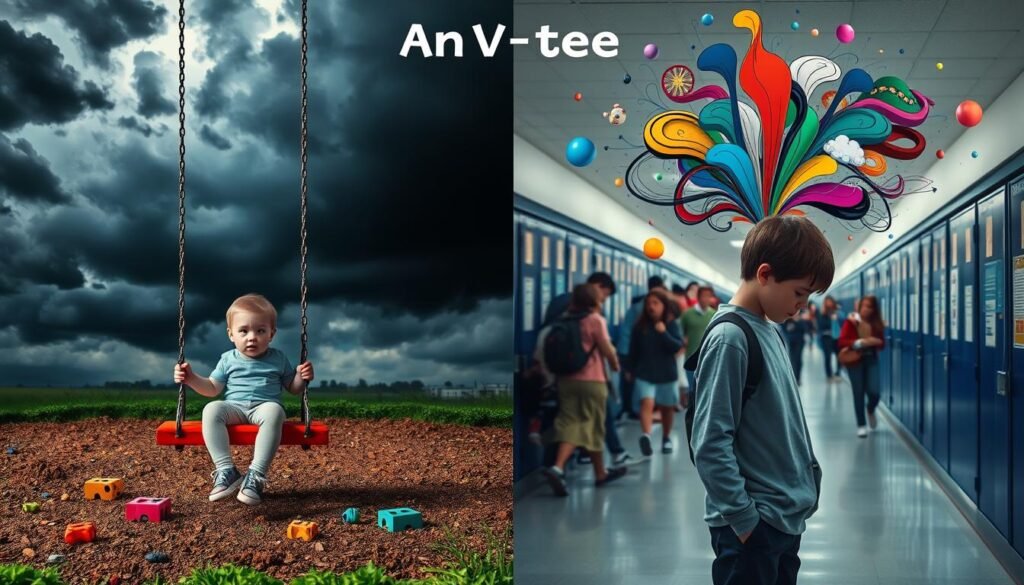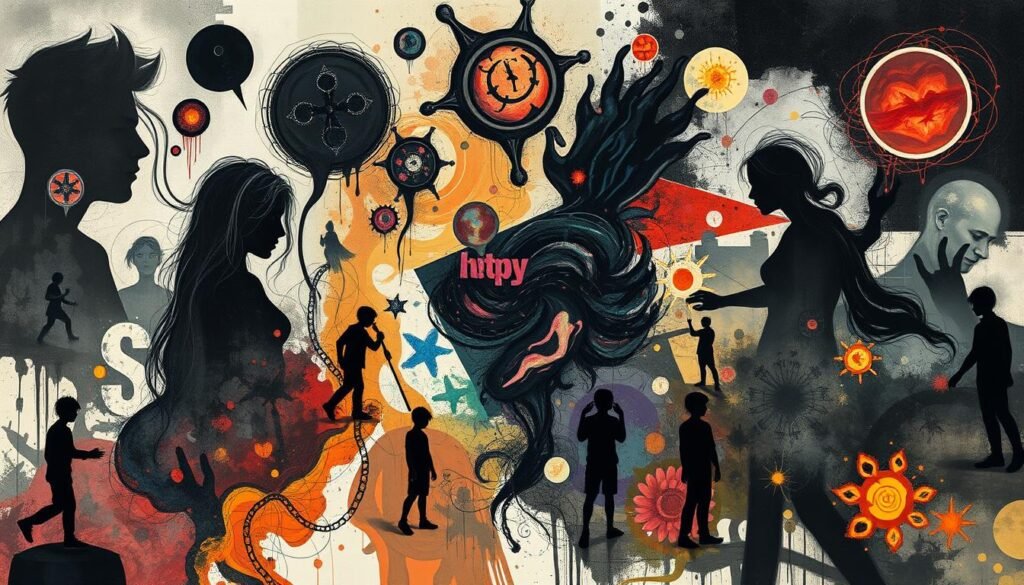Did you know that 1 in 5 young women and 1 in 10 young men aged 16–25 face anxiety? This fact shows the big impact anxiety has on teens. For them, it’s a time of big emotional, physical, and social changes. Childhood and adolescence are key times when anxiety symptoms can start to show up. It’s very important to understand how anxiety in teens is different from younger kids. This is especially true now, when stress has gone up a lot after the pandemic.
Anxiety disorders include things like specific fears, social anxiety, and panic attacks. They affect a lot of young people today. In this guide, we’ll look into how anxiety changes during the teen years. We’ll talk about common signs of anxiety and what causes it to get worse in teens. Knowing these differences helps us better understand teen mental health. It also helps in finding good ways to treat anxiety in teens.
Key Takeaways
- Childhood and adolescence are key risk phases for anxiety development.
- 1 in 5 young women and 1 in 10 young men face anxiety challenges.
- Anxiety disorders manifest differently in teens compared to younger children.
- Common anxiety disorders in teens include social anxiety and panic disorder.
- Increasing prevalence of anxiety highlights the need for effective coping strategies.
- Professional mental health support is crucial for managing anxiety in adolescents.
Understanding Anxiety in Adolescents
Anxiety significantly impacts teenagers today. They face unique challenges unlike those of younger kids. These include stress over performance, self-image, and physical changes.
Teen anxiety can disrupt their lives in many ways. This affects their social life, school performance, and feelings. Symptoms might include fears, irritability, and trouble focusing. Physical signs like shortness of breath, racing heart, and headaches are common too. These issues show why it’s important to see teen anxiety as a long-term problem. For more info, check this out.
Spotting anxiety early in teens is crucial. Without help, it can lead to worse mental health problems, including depression. Getting help early is key to preventing these issues. Treatment can include therapy, changes in lifestyle, and relaxation methods. Sometimes, doctors may prescribe medication.
No two teens experience anxiety the same way. By increasing awareness and promoting good coping skills, those who care for teens can help. This support can make a big difference in their emotional well-being.
Common Teen Anxiety Symptoms
It’s not easy to spot anxiety in teens. They often hide their symptoms of adolescent anxiety well. These symptoms can be both emotional and physical. For example, they might start pulling away from friends and activities.
This isolation can make them feel lonely, making their anxiety worse. Another big sign is irritability. Teens with anxiety may snap at small things or have mood swings. They might also feel headaches, stomachaches, and tiredness. This mix of issues can feel very hard to handle.
Worrying too much is also a key sign of anxiety in teens. This worry can stop them from doing daily tasks or enjoying things. It can make it hard for them to focus or remember things well. This often affects their school work and how they act in fun activities.
Many anxious teens have trouble sleeping. They might have nightmares or cannot sleep. Knowing these signs and how to help can make a big difference in their lives.
| Symptom | Description |
|---|---|
| Withdrawal | Avoidance of social situations, leading to isolation. |
| Irritability | Unexplained mood swings and disproportionate anger. |
| Excessive Worrying | Persistent anxiety about everyday activities. |
| Physical Symptoms | Headaches, stomachaches, and chronic fatigue. |
| Sleep Problems | Nightmares or insomnia affecting daily functioning. |
Causes of Anxiety in Teenage Development
Anxiety in teenagers comes from many sources during their growing years. Some kids are more likely to feel anxious because of their family history. Things like school stress and problems at home can make these feelings stronger.
Friendships add to this stress. Teens often deal with high expectations and compare themselves to others, leading to more worry. Issues with friends or changes in their group can make stress worse. Not knowing how to deal with these issues adds to the challenge.
Big events or personal challenges can cause lasting worry. Nearly one in three teens will face an anxiety disorder by 18. The stats show 19.3% deal with specific fears, while 9.1% struggle with social fears and 7.6% with separation anxiety.
Today’s society also adds pressure on teens. They are always connected, getting too much information without breaks. This can make even top students feel swamped. More tasks without relief increases anxiety risks for young people.
| Type of Disorder | Prevalence Rate |
|---|---|
| Specific Phobia | 19.3% |
| Social Phobia | 9.1% |
| Separation Anxiety | 7.6% |
| Post-Traumatic Stress Disorder (PTSD) | 5.0% |
| Panic Disorder | 2.3% |
| Generalized Anxiety Disorder | 2.2% |
It’s key for parents and teachers to understand these anxiety sources. By knowing the different causes, they can help teens find better ways to cope.
How Anxiety Affects Teens Differently
Anxiety shows up differently in teenagers than in younger kids. Parents, teachers, and mental health pros can learn a lot by understanding these differences. Teens deal with complex social situations and high expectations. Their worries often focus on how they see themselves and how they compare to friends. This is different from the clear-cut fears younger kids might have.
Differences Between Child and Teen Anxiety
Teen years are a critical time for anxiety disorders to start. Some of these issues begin even earlier. The amygdala and prefrontal cortex are key brain parts affecting anxiety in children and teens. Young kids might be scared of the dark or loud sounds. Teens, though, stress about fitting in and their achievements. This shows the changes in what triggers anxiety as kids grow.
Impact of Social Media on Anxiety Levels
Social media really increases anxiety for many teens. When they use these platforms, teens often see things that make them compare themselves to others. This can make them feel not good enough, making anxiety worse. The need to look perfect online can stress them out more. Understanding social media’s effect is vital. It helps in finding ways to lessen anxiety linked to online habits.

| Age Group | Common Anxiety Triggers | Typical Symptoms |
|---|---|---|
| Children | Monsters, strangers, separation from parents | Nightmares, tantrums, clinginess |
| Teens | Peer relationships, academic performance, social media | Worrying thoughts, physical symptoms, social withdrawal |
Knowing the differences in anxiety between kids and teens helps in creating better help and treatments. It also shows how social media plays a role in teen anxiety. This knowledge can guide parents and teachers to encourage healthier online habits for teens.
Teen Anxiety Triggers and Stressors
Understanding what triggers teen anxiety is key. Academic stress and social comparison are big factors. Recognizing these can help parents support their teens better.
Academic Pressure and Performance
School can be a major source of stress for teens. The need to do well and fear of failing can be too much. This can lead to avoiding work or feeling bad about themselves.
Tests, homework, and rivalry with classmates make things worse. Teens start to doubt their own skills. This might make them use bad ways to cope.
Social Comparison and Peer Interaction
How teens interact with friends can cause a lot of worries. Because of social media, they compare themselves too much to others. This can make them anxious.
They try to look perfect online, which is hard and not real. When they see others doing better, it makes them feel worse. Knowing about these triggers helps teens learn how to deal with it better.
Effects of Anxiety on Everyday Life
Anxiety affects everyday life, especially in schools. Many teens face pressure to do well in school, leading to stress. It’s important to know how anxiety impacts school life. This helps us create a supportive environment for teens to succeed.
School Performance and Participation
Stress from anxiety makes it hard for students to focus in class or do homework. Studies show that 65% of people with anxiety have trouble concentrating. This can slow down their learning. Anxiety can also make students avoid school, hurting their grades and social life.
Impact on Relationships and Social Activities
Anxiety affects friendships and social life too. It causes 62% of young people to stay away from stressful social settings. This leads to feelings of being alone and disconnected from friends and family. Over time, it gets harder for them to make friends or enjoy social activities.
Managing Teen Anxiety: Coping Strategies
Managing anxiety in teens can be tough. Yet, effective coping strategies exist that can make a big difference. Things like changing your lifestyle can greatly improve how you feel.
Doing things like exercising regularly, eating well, and getting enough sleep are key. These habits can help lower anxiety. Making these changes allows teens to better handle their feelings.
Effective Lifestyle Changes
Making some changes in your daily life can help manage anxiety. Here are a few good strategies:
- Regular Exercise: Physical activity helps release endorphins. These improve your mood and reduce anxiety.
- Balanced Diet: Eating lots of fruits, veggies, grains, and proteins is good for your mind.
- Quality Sleep: Getting enough rest is important for managing emotions and staying focused.
- Routine Development: A steady daily schedule can make things feel more predictable. This helps ease anxiety.
Mindfulness and Relaxation Techniques
Adding mindfulness and relaxation to your routine can also help. These practices bring a sense of calm and control:
- Deep Breathing Exercises: Taking deep breaths can slow your heart rate and ease tension.
- Meditation: Focusing on the here and now through meditation can help you relax.
- Yoga: Yoga mixes movement with mindfulness for better physical and mental health.
- Progressive Muscle Relaxation: By tensing and relaxing muscles, you can reduce physical stress.
Teenage Anxiety Disorders Overview
About 15%-20% of teens have anxiety disorders. These can come from school pressure, society, and personal relationships. It’s important to know about these disorders and look for signs of depression in young people. This helps adults provide the right support early on.
Types of Common Anxiety Disorders
Several types of anxiety disorders may affect teens, including:
- Generalized Anxiety Disorder (GAD): Characterized by chronic worry and tension about various life aspects.
- Social Anxiety Disorder: Involves intense fear of social situations and the perception of being judged.
- Panic Disorder: Features unexpected panic attacks and persistent concern about future episodes.
- Specific Phobias: Defined by excessive fear of specific objects or situations, leading to avoidance behavior.
- Obsessive-Compulsive Disorder (OCD): Involves uncontrollable, recurring thoughts (obsessions) and behaviors (compulsions) performed in response to those thoughts.
- Separation Anxiety Disorder: Excessive fear of separation from significant attachments, common during adolescence.
Signs of Co-occurring Depression
Teen anxiety disorders can overlap with depression. This can make it harder to diagnose and treat. Look for signs like always being sad, pulling away from fun activities, and changing eating or sleeping habits.
Also watch for trouble with focusing, feeling worthless, or too much guilt. Catching these signs early helps in dealing with them. Getting professional help, like therapy or medication, can really help teens feel better.

| Type of Anxiety Disorder | Common Symptoms |
|---|---|
| Generalized Anxiety Disorder | Chronic worry, trouble focusing, physical tension |
| Social Anxiety Disorder | Fear of social interactions, avoidance of social settings |
| Panic Disorder | Panic attacks, racing heart, shortness of breath |
| Specific Phobias | Intense fear of specific objects, avoidance behavior |
| Obsessive-Compulsive Disorder | Recurring thoughts, compulsive behaviors |
| Separation Anxiety Disorder | Fear of being apart from caregivers, distress during separation |
Professional Treatment Options for Teens
Treating teenage anxiety often requires a tailored approach. Cognitive Behavioral Therapy (CBT) is a top choice for managing anxiety. It works even better when combined with medication. It’s essential to support teens because about 60% of those with anxiety don’t get the help they need.
Selective Serotonin Reuptake Inhibitors (SSRIs) are a go-to for treating anxiety in teens. Brands like Prozac, Paxil, and Zoloft are well-known. If SSRIs don’t work, doctors may try Serotonin-Norepinephrine Reuptake Inhibitors (SNRIs). For serious anxiety, Benzodiazepines could be an option. However, the American Academy of Child and Adolescent Psychiatry advises against medication for mild to moderate cases.
It’s worth mentioning that medications can have side effects. These include dizziness, nausea, and sexual function changes. There’s also a warning about increased suicidal thoughts in teens on antidepressants. So, both therapy and medication need careful monitoring by professionals.
Other therapies like Mindfulness-Based Cognitive Therapy and Dialectical Behavioral Therapy can help too. Adding exercise and good nutrition improves mental health. Getting early help and the right support is key in tackling anxiety in young people’s lives.
| Treatment Type | Description | Effectiveness | Common Medications |
|---|---|---|---|
| Cognitive Behavioral Therapy (CBT) | Therapeutic approach focusing on changing negative thought patterns and behaviors. | 50%-70% success in symptom reduction. | N/A |
| Medication | Pharmaceutical treatments to alleviate symptoms of anxiety. | 60%-70% adolescents respond positively. | SSRIs, SNRIs, Benzodiazepines. |
| Mindfulness Techniques | Strategies that promote mental wellness through awareness and acceptance. | Effective in reducing stress. | Meditation guides, apps. |
Supporting Anxious Teenagers: A Parent’s Role
Helping anxious teenagers is important. It involves open talks and making them feel supported. Parents need to understand their teens’ worries. They should create a safe space for talking about anxiety. This helps teens deal with anxiety better.
How to Communicate Openly
Good communication is essential for helping with anxiety. Listen without judging to build trust. Here’s how to talk openly:
- Discuss feelings in a simple way.
- Ask specific questions about their emotions.
- Show you’re interested in what they think and feel.
- Let them know you understand their struggles.
- Be patient, opening up takes time.
Building a Positive Support System
To make teens feel secure, build a strong support system. Connect them with family, friends, and professionals. Here are ways to help:
- Encourage them to hang out with friends.
- Find trusted adults they can talk to.
- Set up a routine with activities that reduce stress.
- Use mental health resources for teens.
A strong supportive network is key for anxious teens. It shows them they’re not alone. This helps them develop better ways to handle stress and grow emotionally.

Resources for Youth Mental Health
For adolescents facing mental health challenges, finding the right support is key. There are many types of help available, from self-help books to professional advice. This section lists important books and online tools. It also offers advice on choosing the best mental health professional.
Books and Online Tools for Support
There are many great resources for youth mental health out there. They can help with education and emotional challenges. Some top book picks include:
- The Anxiety Workbook for Teens – It offers a friendly way to deal with anxiety.
- Mindfulness for Teens in 10 Minutes a Day – This book teaches mindfulness skills.
- The Stress Reduction Workbook for Teens – It provides tips to manage stress well.
Also, online tools like apps and teletherapy help teach coping methods in an interactive manner. Services such as Kids Helpline and Headspace give private support and build community. They are great for teens looking for mental health help.
Finding the Right Mental Health Professional
Choosing a good mental health professional is important for dealing with anxiety and similar issues. Young people can get help from:
- School counselors
- Pediatric psychologists
- Local community health centers
- General practitioners
- Child and adolescent mental health services
It’s very important for parents to help their kids find the right professional. The right one understands how anxiety shows up in teens. They know about the rise in anxiety cases among kids today. Luckily, therapy can be more affordable thanks to Medicare rebates. With the right help, young people can manage their mental health effectively.
Conclusion
Understanding how teens feel anxious is key to helping them. It’s vital since anxiety is common among them. About 15%–20% of young people battle with it. Teen anxiety is more than feeling stressed. It’s about seeing the signs and finding ways to deal with it. This includes getting professional help when it’s needed.
Many teens, around 31%, deal with anxiety, but only 18% get help. This shows a big need for better support from parents and caregivers. They can truly help teens live happier lives. Also, knowing how anxiety connects to other problems like depression is crucial. It shows why it’s so important to not just notice the issue but to act on it.
To really help, we need open talks and to use resources around us. This way, teens can learn to handle their anxiety better. By putting focus on understanding and managing teen anxiety, families make a big difference. They help set up a future that is not just brighter but healthier too.